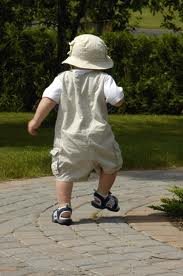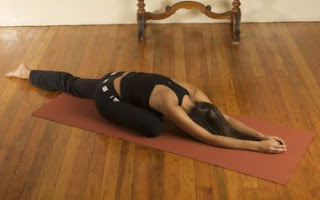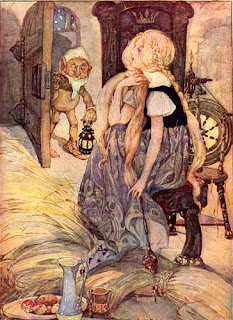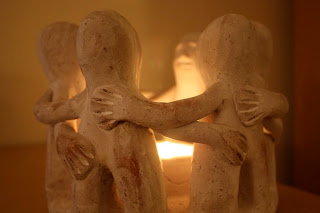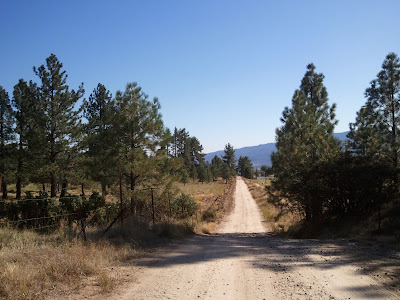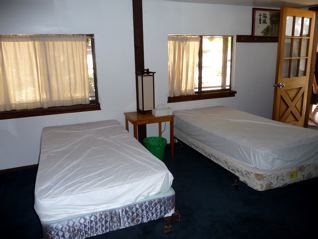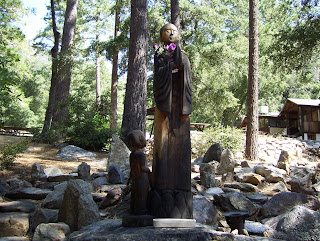 |
| Alan Elgar, 1922-2005 |
Alan Elgar, my Dad, was born on October 3rd, 1922 and died on October 14th, 2005, of pancreatic cancer. Every year, the days between those two dates are filled with memories of him. So here it is October again, and he is very much on my mind, especially since this year, like the year he died, October 14th falls on a Friday. By this date six years ago, my sister Claudia, our Uncle Dick and I had gathered to keep watch over him: Claude from Turkey, Dick from Australia and me from California. Dick, retired surgeon, an Englishman like Dad, married to my mother's youngest sister Dedee, considered Dad his brother. All of us stayed in Dad's flat in Camberley, thankful he was able to stay home to the end.
In his memory, I would like to share with you the pages I wrote for family and friends immediately after his death, detailing the last week of his life and his extraordinary final hours.
********************
Well. Here it is, Dad's Final Hours, which actually expands to Dad's final days, because he thought his final hour had come much earlier in the week...
Where to begin?? With Gaby [my mother's sister] who came over on the Eurostar, straight from Paris to Dad's bedside...
Gaby had actually arrived from Paris on the Thursday, the week before Dad died. How elegant she looked, in a magnificent camel coat and very cool new shoes! Dad too had made a huge effort on her behalf, putting trousers on, debating with Dick which shirt to wear, allowing Dick to shave him... It was very touching to see the two of them together, their 60 plus years of shared history culminating in these last few days. At first, when Gaby saw Dad, she told us confidentially that he could go on for weeks like this - he was up, drinking soup, even a little sherry, being a part of the conversation. Gaby returned again on Saturday, Claude's birthday, to spend the afternoon with Dad while I took Claude out shopping for her birthday. We - Dick, Gaby, Claude and I - enjoyed a delicious Indian meal (from the take-out place at the end of Hawley Road) in the kitchen, once Dad was in bed. However, when Gaby came back again on Sunday, Dad was feeling the efforts of the past few days and stayed in bed. Gaby asked for a chair so she could sit next to him, and she was wonderful, subduing her vast energy so that she could sit quietly next to him for 45 minutes, doing nothing but holding his hand gently.
Sunday night, we were all gathered about his bed, Claude, Dick and I. Dad cocked us a glance and said, "I know what you're all thinking - you think I'm going to pop off tonight."
We murmured in agreement, um yes, this wasn't totally off the wall.
"Well, I'm not, so go away."
I persisted, "But how do you know?"
He sounded irritable and said, "Because I have some addresses to give you."
I asked, "Are you sure you don't want to give us the addresses tonight?"
"No. Plenty of time for that tomorrow. Now go to bed."
For the first time since our arrival, Claude and I stayed at Hawley Lodge, instead of going off to a friend's house, half an hour away, to sleep. We pulled out two camp beds and set them up in the living-room so we could hear Dad in the night. Dick was ensconced in the guest room and had been there before we arrived so we left him settled where he was.
Monday, and we did the last of the paperwork, Dad and I - the addresses he had to give me were his three pension plans, which I thought was very interesting. After all, I'd been helping him get his papers in order since May - but this, this was 'the money' without which he could not live. It was his last bit of control, and giving it up was the first real sign on his part that the end would be soon. In fact, we all - Dad included - thought the end would be that Monday night. After all, the paperwork was done, his mind was at rest, and even more telling - he cautioned us to call his sister, Audrey, who had hired a car and driver to come visit him the next day. He said, "You'd better tell Audrey to phone before she leaves tomorrow."
"Oh. Why, Dad?" says me, all innocence, curious as to what he would say.
"Because I might be gone."
Of course I called Audrey that night to alert her - she said immediately, "He has a 'feeling'" and decided not to come at all, since anything could happen on the four hour drive.
We said goodbye to Dad that night as if we would never see him again - funnily enough, it wasn't sad or anything, at least not terribly, as you might imagine it would be. It seemed 'right and fitting' as they used to say in church. We sat on either side of him and told him how much we loved him, and what a great father he had been, and he said quite chattily, holding our hands, "Yes, we have always loved each other, haven't we? I've never understood these families who never got on. We always did, didn't we?" Gaby had shown me how to moisten a cotton ball and wet his lips, since drinking was a strain - as I was carefully doing this, on the Monday, trying not to squeeze too much water out, not to make him choke, concentrating like mad, under Claude's nervous gaze, Dad looked me in the eye and said "I always knew I should never have got you that nurse's outfit!" At which, we all collapsed laughing, Dad so pleased to have made us laugh! We kissed him good night, and he waved his fingers, one at a time, in that way he had, and said "Gooly, gooly" which is horrible Anglo-Turkish for 'gule, gule', or 'bye-bye'. And we laughed and said "Alasmaladik (spelling?), you old Turk!" which is what you reply to 'gule gule' and we left the room, leaving the door a little ajar. He also said, meaningfully, we thought, "If I'm sleeping tomorrow, don't wake me up." And we were all smiling, albeit a bit apprehensive. Would he really be dead when we woke up the next day?
Well, no. And his face when he realized he was still here - oh, the disappointment. He had been so certain, and so had we... Tuesday was a funny day, Dad almost at a loose end. Instead of lying down on his bed after lunch, as he had been doing, he sat in the living-room where we were all reading quietly, and I thought to play his various CDs on 'The Classic Experience'. I sat beside him on the sofa,and got him a hot-water bottle for his back, and also massaged it, while we zipped through several CDs. Luckily I had the remote and could skip or increase the volume, as he wished. He didn't want to hear Carmina Burana, he wanted Claude and I to sing our 'duet' to 'Belle Nuit' which we had learned as children back in Haiti, and he wanted the volume turned up loud for the Slaves Chorus from Nabucco, and Figaro. I thought idly what a weird afternoon, music to die by. It was a strange and rather magical experience. When the music was all over, and Claude and Dick were in the kitchen preparing dinner, Dad awkwardly put his arms around me and I would swear that a tear slid down his nose and fell on my head. The one and only time.
That night, Dad's dear friend Pat had arranged to come over to tell us all about her weekend at her daughter's wedding. Pat had been by the previous week to tell us what she was going to wear etc. so we were eager to hear how it had turned out. Dad went back to his bed just before Pat's arrival, and when we heard her at the door, he said, "Quick, Ali, my teeth!" and I raced to fetch them, motioning Claude to delay Pat in the hall - of course we couldn't get the bloody things to fit, so Dad gave it up in disgust. I put some lip stuff on his lips so they would be 'kissable' - he grinned - and Pat went in. She closed the door and came out a while later, looking rather shaken, but said they'd had a good talk and were able to say how much they had meant to each other. We invited her to stay for supper. Dad called Claude in and said, "I hear you've invited Pat to supper. That's jolly kind of you." And then, "What are you having?!" He got up and joined us, even had a tiny glass of wine, and a tiny dish of stewed apple and cream - which he couldn't keep down, and which turned out to be the last bit of solid food he attempted to eat. But we had a lovely evening, chatting about the wedding and this and that, as if nothing were wrong. Death seemed very far away that night, and sure enough, Wednesday morning, Dad was still there.
When the District Nurse Sandra came by that morning, she and Dick conferred on a likely timeline. They agreed that in 24 hours 'things would likely be very different' and 48 hours, 'for sure'. They discussed pain medication, and the fact that Dad had had that back-ache yesterday, but hadn't wanted to take his morphine, afraid that it would cloud his mind for his visit with Pat (so we think, anyway - he never actually said this). Sandra suggested something called a morphine 'driver' which would administer the morphine on a continuous basis, nothing more than he was already receiving, but on a small but steady supply, rather than in a little shot glass which was how he was getting it, all at once, just before going to sleep at night. She said it would do a better job of managing his pain in this way. We didn't think he'd agree to have this done - he'd always been leery of the morphine, making semi-jokes about becoming an addict - but Sandra went in and asked him and came out again in minutes saying, "He's agreed." We took that to be another sign that he had truly had enough and if the morphine would hurry it up, then good.
From this point on, Dad did not get out of bed again, did not eat or drink and barely spoke. We took it in turns to sit with him in the chair beside his bed - we even rigged up a lamp so we could read there once it got dark. His breathing was an event - sometimes it would stop completely, and then, after an age, it would start up again. It did make it hard to do much else besides just watch him breathe. His eyes were always half open, but unfocused, and you yearned to tell him, 'go on, close your eyes, it's ok, go to sleep!' - how he fought it!! Wednesday night, I moved my little camp bed into Dad's room and slept by his side - an uneventful night.
Thursday, I went to the little church down the road - there was no-one there but an elderly couple, obviously keeping an eye on things. When I appeared and lit my candle and knelt quietly, the chap gave me a heartfelt concert on the organ, running through a whole repertoire of hymns. I thanked him when I (and he) were done and he said modestly that he always likes to give people a 'bit of music to pray to' when they come in like I did. Made me smile!
I got home just before noon, and Claude said I was just in time, Dad wanted his feet massaged. Either Dick or I did this job - I was happy to do it, putting cream on those feet, thinking of all the miles, all the places where they had walked in his lifetime. The worst thing about being a caregiver to someone who is dying is knowing that there is nothing you can do to really help. So any little thing - like listening to the music, like giving a massage - is great because for a moment you feel useful, as though you are sharing the load. Dick's daily job was to wet a washcloth with warm water and wipe Dad's face with it. I knew just how much pleasure he got out of doing that little thing. Claude's special task was the smooth running of the house - all the behind the scenes stuff, like laundry and cooking. She told me she didn't actually enjoy doing that stuff, but it had to be done, and I thanked God for my older sister, who is so responsible and take-chargeish and organized, just as a first-born should be. (I have no hidden talents in this direction, but Dick proved to be a terrific ironer.)
Sandra came to check up on Dad, and after conferring with us, went in to tell him what a privilege it was for her to know him and to help him. She held his hand and asked him to squeeze it if he understood. Claude, Dick and I listened, unashamedly crying because her words came straight from the heart. She told us later that he had understood, he squeezed her hand at every important point she made, so she was satisfied he had heard her. Michele [Gaby's daughter], Gaby and Pierre came by that afternoon, and we all took it in turns to sit with Dad, and the Leveques got a chance to say goodbye too.
How did we know Thursday night was truly it? Was it because by now Dad had extended his timeline by several hours and we felt he surely couldn't last much longer? Was it because the District Nurses had come in earlier that afternoon and hooked him up to a catheter, which seemed very serious and final? ("You will never go to the loo again...")
In the evening, Dad grew agitated and seemed to want to get up. This was unnerving - Dick said he couldn't possibly go anywhere, he was too weak to walk any distance. Claude said, "I know where you want to go, you want to go to the living-room and sit in your spot next to the telephone, don't you?" Dad nodded weakly. We suggested that since that was just too far, that he sit in the little chair beside the bed and we would pretend it was the living-room... It was an excruciating effort to move him from bed to chair - it took the three of us about 15 minutes, it seemed, because we had to get him up, then get his feet turned the right way, then get his knees to bend - we were all sweating when it was done. We weren't quite sure what we were supposed to do next, or what Dad wanted, so we started reminiscing about holidays long gone, until finally Dad made a motion with his hand and said softly, "Enough." We took advantage of his being out of bed to change the sheets, Claude and I, and put new pillowcases on - remember, he hadn't been out of bed for two days straight. Then we bundled him back in, another exhausting effort, said our goodnights and went back out to the living-room. Claude said to me, "You aren't going to sleep in his room next to him, are you?" and there, we knew then that this was it, and I said a dubious 'no' because I wasn't sure if I wanted to wake up next to a dead body, even if it was my Dad's...
As it turned out, I couldn't stand it. I was on the sofa in the living-room (we left my campbed where it was in his bedroom, just in case), and I kept hearing all these loud noises - oh, how to describe them in words?? They sounded as if he were saying 'O' - the short 'O' sound, as in 'fox' - but loud, LOUD, and a whole burst of them, all on the out-breath. Then there would be silence, and then they would start up again. I couldn't stand it, just listening to this, not knowing what was happening, so I went in and at first lay on his bed beside him, careful about the catheter - he seemed so agitated, and his arms would flail about on these 'o' sounds - it was rather alarming. I decided there wasn't enough room on the bed for the two of us, so returned to my campbed. From there, whenever he started with the 'o's and his arms would swing up, I'd grab an arm and stroke it and try to calm him ' there, there, Dad, it's ok' etc. Finally, though, it dawned on me what this reminded me of. It sounded like a woman panting, breathing hard, in labor. It occurred to me that it must be every bit as difficult for the spirit to leave the body as difficult as it is for a baby to leave the body... The next time Dad went through this rigmarole, instead of soothing him, I encouraged him "Go on, Dad! Go! Go!" and when it was over and his breathing was normal again, he whispered, "I know". Meaning, I know I need to go but it's not so easy...? That's what it seemed to me. Anyway, after I had sorted out what this was all about in my head, the sounds didn't bother me. In fact, it seems to me they stopped then or shortly after.
However, the next thing that happened had me wide awake. All of a sudden, Dad says, clear as a bell, slowly, deliberately, "What... the... heck?" in a completely puzzled tone of voice. There's a pause, as though someone is answering him, and then he says, "Oh! So that's what that's for!" Remember that he had not really spoken in two days, and certainly not clearly like this. I shot out of bed and went to get Claude - "Claude! Claude! Dad's talking to I don't know who and it's really interesting! Come quick!" Dick was right there pacing the corridor, so he came too and we all sat and watched and waited, Claude and Dick on one side of the bed, on the stool and the chair, me on the other on my little campbed.
At one point I sat up and said to Claude in a puzzled voice, "Did you just whisper something in French?"
Claude said, "No. Nobody's said anything."
I said, "Well, that's really odd, because I just heard someone whisper in my ear, 'Il partira toute de suite.'"
We all said hm! and then thought no more about it, because at this point Dad's breathing suddenly changed into this awful rattly, gurgly thing. This was just stomach-twisting to listen to, definitely the worst thing that had happened so far, terribly distressing. Thank God for Dick, who assured us that this breathing, though noisy and horrible to listen to, was not in fact causing him any pain. He said it might alarm him if he could hear himself, but it didn't seem to be doing so, so we would just watch and wait... We sat about and watched and listened and had a terrible shock when we realized that he was choking on this liquid and about to throw up! We raced about looking for something to be sick in - Claude remembered brilliantly where a little bucket was kept - but in fact it was a false alarm, and he wasn't actually sick. Still, it shook us out of our spectator pose, the more so when Dad started on with this "Pull me up!" Of course we thought he wanted to sit up, so he wouldn't choke any more on that ghastly liquid in his lungs, and this is where I climbed into the bed behind him so he could lean against me and be supported. (Again, the wonderful feeling of being able to actually DO something, as opposed to watching in anguish...)
Even sitting up, his breathing continued to rattle and so Claude has the great idea to telephone Sue the Vicar - she said, "I think Dad needs help, what do you think?" and we all agreed that this was a fine idea. By now it's around 8 in the morning. By virtue of an amazing series of coincidences, Claude had, right by the telephone, the phone number of the only people we knew who were likely to have Sue's home phone number : she called them, they had it and within minutes, Sue was on her way. Meanwhile, dear old Betty telephoned at 8:45 a.m., as she'd arranged the night before when we thought it wasn't looking good - Claude said, "If you want to see Dad, you'd better get over here fast" and she did, doing the walk that normally took her half an hour in just twenty minutes. She said she had never walked so fast in her life, and here she is 79 years old.
So now the tableau is set. I am sitting behind Dad, cradling him in my arms and my legs ('like a Pieta,' said Claude - I don't know about that, but I do find it interesting that I could sit like that without moving for almost three hours), one hand on the top of his head, because I had read somewhere that babies like to feel pressure on the tops of their heads, it reminds them of the womb, and I thought it might be comforting at the end of life too; Claude is sitting on the bed holding Dad's left hand; Dick is at the foot of the bed, massaging his legs and feet; Betty is sitting next to me holding his right hand. Sue is sitting on a stool between Claude and I. The first thing she did when she arrived was to anoint him with oil - not apparently an Anglican thing, they don't have the sacrament of Extreme Unction, but I can't tell you how comforting it was to see her do this and intone these solemn End-Of-Life words. I felt he was in the hands of an expert now and the whole thing was out of our hands...
After the anointing, Sue read quietly passages from her Bible, The Lord is my Shepherd, among other things. (Towards the end, Sue kept saying quietly, over and over again, "Jesus, take him, Jesus, take him...") And this is where Dad, quietly talking to himself, difficult to understand because he is still gurgling, says, so we all hear, "Hello, it's Alan" as if he were introducing himself, and then "Pat" and "Arthur" and "There's my sister!" We imagine the Pat he was referring to was his Auntie Pat - we had been looking at photos of her as a young woman that his sister's family had sent to him, back in May. Claude and I knew Auntie Pat as a very old (she lived to be 105!!) and completely deaf old lady but Dad protested and said ,"No, no, we all loved Auntie Pat, she was our favourite aunt!" Arthur was his uncle... And Kath, his sister - his eldest sister, whom he adored, and who had just died in January... It made sense that these people from his earliest childhood, trusted and well-loved family, would be there. As Betty said, "He's being met." I asked Claude to show me on her face what Dad's face was like, since I was sitting behind him and couldn't see - she said, "He has an expression of complete wonder, looking, looking, just amazed." We were also sitting there looking pretty amazed. When Dad started up again with his "Pull me up," it was Claude who realized what he meant and said, "Aren't we clots! He's not talking to us, he's talking to them, the people on the ceiling!"
And so, gradually Dad's breathing grew quieter - Stephanie, the 25 year old District Nurse, for whom Dad was her first death all on her own, conferred with Dick and gave him something to help with the breathing, but Dick said later that his breath was getting shallower and shallower and he just wasn't breathing deeply enough to stir up all that awful liquid. We all sat quietly, listening as he quietened down... Suddenly Claude, who was watching his eyes carefully, her face just crumpled, like a little girl's, and she said, "Oh! Good-bye, Dad!" and she said later she could almost see his spirit leave his body. We continued to sit in our positions a few moments longer, while little Steph made sure that he was truly dead, and then I extricated myself from behind him, and we arranged him gently flat on the bed. Quietly we withdrew, all a bit in shock, and did as all good English do, had a cup of tea.
Steph and Sue the Vicar left fairly soon, Betty went in to Dad to say her last good byes, and the Original Three started notifying people. Pretty soon, the phone was ringing off the hook. Periodically we would go in separately and look at Dad - he looked as he had done those past few days, so it was hard to comprehend that he was really gone. We would touch his chest under the covers - his skin was still warm, the illusion could continue... The undertakers called to see if we wanted them to come right away or wait until the doctor came to us to sign the cause of death certificate. We said we'd wait for the doctor to come - it seemed too soon, after all these months, weeks, days of waiting, to ship Dad out the minute it was all over. Of course the doctor was horribly late (in fact he never did come, the idiot - but that's another story) and the only time I personally broke down was when I went in to check on Dad in the early afternoon and his flesh, even under the covers, was like ice. I just howled to poor old Dick, "He's so cold! So cold!" And Dick was very comforting, hugging me like I was a little kid, murmuring, "I was afraid this would happen if he stayed here too long..." Shortly after that, the undertakers came and very respectfully carried Dad downstairs on a stretcher covered with a cloth. They even straightened the bedclothes a bit. We all spent time in that room once it was empty, staring at the bed, scene of such emotion, such passion, now so still.
Our day passed with a visit to Easthampstead Park Convention Center, the place where we had the reception - it seemed such an odd thing to be doing the afternoon that our Dad had died. I suppose anything we did would have seemed odd. I remember stiff drinks once home again - I guess there was dinner, but I don't remember it. Next thing I do remember was Claude and I lying on our little beds (we moved mine back out to the living-room), going through the whole sequence of events. Claude said, "One thing I don't understand is, where was Mum in those people on the ceiling? Why didn't he say 'Maryse!'"
I said, "Well, he said an awful lot that we just couldn't understand ..." and then I remembered the whisper in French. "Hey! Claude! I did tell you about that voice whispering in French, didn't I?" "Yes!"
"Well then, who else could it be but Mum??"
And thinking about it since, I've thought, yes, a whisper because it disguises the voice - if I had actually heard Mum's voice loud and clear, I think I would have freaked out; but then the words are in French to make it clear that this is not me - I certainly wasn't up to thinking in French at that moment - it was around 5 a.m. - and besides, if it was me talking to myself, I would have said 'Il va partir' not 'il partira' which is much harder for a foreigner to say. I checked later with Gaby and Michele, and they both agreed that 'il partira' is very correct French, such as Mum for sure would use. I am so glad I said something to Claude about it at the time, proof I wasn't making it up or dreaming.
We all slept like logs that night! Next day, we had been invited to Michele's for lunch. En route in the car, I dared ask Dick what he thought of the whole experience. I was so afraid he was going to say it was a morphine hallucination or something... To our JOY, Dick absolutely pooh-poohed the morphine idea, said Dad hadn't been on any more morphine then than he had taken at other times, and he hadn't hallucinated before so why would he start then? He also suggested that the morphine driver was not necessarily a good method of disseminating the drug, since Dad had so little subcutaneous fat left - he thought that if one were to cut into him after death, one would find a little pool of morphine just sitting there... Plus, he said, "Don't forget when you are telling this story about 'Pull me up!', that Alan had both arms raised in the air - this at a time when he had very little muscle control left - he shouldn't have been able to maintain that position for any length of time, if at all." The upshot? Dick believes that 'something spiritual' was happening, and that is surely enough.
Perhaps this whole experience is something that must happen to you before it becomes believable. Certainly I had read about this sort of thing and was open to the experience, and I would have said I believed, but it would have been more of a hope... Being there, however, removed any shred of doubt - not least because this was happening to Dad, of all people, who had not read of any of this, and didn't want to talk about it, and claimed it would be the 'last adventure' and he'd find out what it was all about when he got there. I think it interesting that in spite of all my reading, it was Claude who broke the code, who understood the meaning of 'Pull me up!'
On reflection, I really love my labor analogy - interesting that in the joy of having a baby at the end, women tend to forget just how painful labor is - painful and bloody and messy and endless, sometimes. And how some people have no trouble, and others have lots. And perhaps because we are conditioned to seeing death as a negative experience, we don't understand that it is simply a passage, and somewhere that newly freed soul is being greeted with as much joy and love as we greet a new baby here on earth. Frances (Dick's daughter) kept saying through Dedee (Dick's wife), who passed it on to Dick, who told us, "Wait until it is all over before you say what sort of death it was - you need to see the whole picture." It is true that, up to the very last bit, Claude and I were just in anguish, I said clearly to Claude, "This makes you believe in euthanasia," because Dad seemed so distressed, his breathing, his agitation... It was so hard to watch. But imagine if he had been in a hospital, or even a hospice - Dick says he would have been given mega-doses of morphine, would have fallen into a coma, would have died - and we would have declared it a horrible death. Thank God for Dick!!! He refused to increase the morphine, saying he wasn't actually in pain. And so Dad was able to go clear-eyed - when we say he was looking at the ceiling, he really was looking, not with misty, out-of-focus druggy eyes, but clear eyes, focused eyes, alert eyes - and gave us the gift of those extraordinary last words.
It is interesting, the people who hear this story. They either dismiss it as the shutting down of the brain, some last image thrown up by a dying mind (to which I say, what about my French whisper? I was neither on morphine nor dying, so what was that then?); OR they accept it utterly, with great enthusiasm and joy. My old headmistress from Farnborough, Mother Alexander, now living in Ireland, with whom I had a long conversation the night of the funeral, is in the joyful camp : she said "Marvelous! This is what is meant by 'the communion of saints'! How lucky you were to witness that!" And I don't understand why anyone would NOT want to believe this. My own John doesn't and it's quite a sore point. He believes it happened as I said, he just doesn't believe my interpretation. He asked me "What does it mean to you?" I thought it so obvious, I couldn't believe he had to ask. But if I have to spell it out, to me, it shows me that there is something more after death, that we do not die (because where did those dead people on the ceiling come from?), that death is neither frightening nor lonely nor the end of things - at the very least, it shows me that we don't have the answers and Shakespeare had it right when he said "There are more things in heaven and earth, Horatio, than are dreamed of in your philosophy," and why not lean towards an optimistic view???
Perhaps the most telling thing is the difference between Dad's death and Mum's. Certainly Mum was younger and it was sudden and a great shock, and there was nothing remotely comforting about any of it. I grieved for Mum for years, and can still put myself back in that terrible place when I first heard that she was dead. With Dad, I feel completely different. I examine myself, wonder if perhaps I am in denial and everything will catch up with me at some later date. But no, I just cannot feel sad. Yes, of course I miss Dad, but the Dad I miss is a Dad who hasn't been around for some time now. Before the cancer, there was his hip, which meant he had to give up his beloved walking; and then there was diabetes, which meant no more sticky toffee puddings, which were harder to give up than smoking, he said. If Dad could have been restored to a younger, healthier self, well then, that would be one thing - as he was, it was not a life, nothing one would want to see prolonged. I believe now that Dad has been restored to that younger, healthier self, I believe he is reunited with Mum and his family and friends who have gone before, I don't for a minute think that he is dead and gone, never to be seen again. I think he is lucky to be out of this world and all its troubles. But the memory of him, how he looked on life and how he handled himself in all situations has given, not just me, but all who knew him, a road map for how to behave. His dying revelations were simply more of the same - a road map for what lies ahead, and I for one and extremely grateful that I got to be there, and witness it, from the incredibly privileged position of holding him in my arms.


